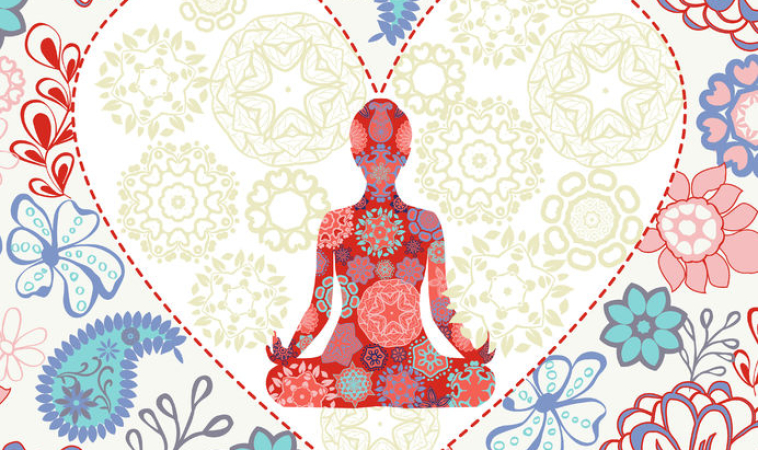Elena Jutai, ND
February is American Heart Month
 As a nation, America’s leading cause of death for both men and women is heart disease. Heart disease causes heart attacks, strokes, and kills more people than all forms of cancer combined. 1 As a nation, we really need to take this matter to heart.
As a nation, America’s leading cause of death for both men and women is heart disease. Heart disease causes heart attacks, strokes, and kills more people than all forms of cancer combined. 1 As a nation, we really need to take this matter to heart.
Heart disease is arguably related to genetics, how we handle our negative stressors, the diet we choose, our physical activity and our overall lifestyle habits.
Embracing a mindful lifestyle and an individualized yoga practice can help you achieve a healthy heart.
5 Ways Yoga Can Help Your Health
1. Overall Yoga Helps Decrease Your Cardiovascular Risk
Increased cardiovascular risk means you have an increased risk of heart disease.
The International Journal of Cardiology published a study supporting that yoga improved cardiovascular disease risk factors including: systolic and diastolic blood pressure, heart rate, respiratory rate, waist circumference, waist/hip ratio, total cholesterol, HDL, VLDL, triglycerides, and insulin resistance. Relative to exercise, yoga improved HDL over 6 points more. This supports that yoga can be considered as an ancillary intervention and for patients with increased risk of cardiovascular disease.
2. Yoga Lowers Blood Pressure
High blood pressure is a risk factor for heart disease.
Yoga has been shown to effectively reduce blood pressure in both normotensive and hypertensive populations, suggesting that yoga is an effective adjunctive therapy for hypertension and worthy of inclusion in clinical guidelines.3
3. Yoga Improves Your Lipid Profile
Q: What is a lipid profile?
A: A lipid profile helps estimate your cardiovascular risk. There are three main types of fat we measure in a lipid profile. (1) “Healthy” HDL which we want higher for its heart-protecting effects, (2) “Lousy” LDL which we want lower because of its contribution to blocking arteries, (3) and triglycerides, which we want lower as it is associated with an increased risk of cardiovascular disease.
Yoga has been shown to significantly improve the lipid profile, reducing lousy LDL and triglycerides while increasing healthy HDL.4,5,6,7
4. Meditate your way to Heart Health
Transcendental meditation, in secondary prevention of coronary heart disease, was associated with a 48% risk reduction in all-cause mortality, heart attacks, and stroke. In this particular study, many yoga practitioners expressed a significant reduction in systolic blood pressure and expression of anger.8
5. Yoga Decreases Stress & Promotes Relaxation
Stress is one of the most common contributors to heart disease. I commonly see patients who lead stressful careers and lives while they are also suffering from hypertension. While promoting relaxation yoga can also help lower blood pressure. Yoga practices have been shown to have similar outcomes to cardiac rehabilitation. It improves physical fitness, reduces stress and promotes healthy lifestyle changes. Yoga promotes general well being and better quality sleep and decreases physiological arousal.9,10,11
Yoga and Health Professionals
Yoga is becoming increasingly recognized by health professionals as an ancillary to cardiac rehabilitation programs and as a general tool for healthy lifestyle promotion. Dean Ornish, MD., a well-known American physician, values the benefits of yoga and meditation and includes it in his heart disease recovery programs. He is an advocate for prevention and reversal of chronic diseases through lifestyle changes.
How to find the right yoga class for your heart?
I recommend that my new to yoga students start with a gentle hatha yoga class. The premise of hatha yoga is mindful movement with the breath. Hatha yoga is a general umbrella term for many paths of yoga so it is important to ask how vigorous the class will be and to take your current abilities into consideration.
For heart health, I recommend a hatha yoga class that focuses on asana (poses), pranayam (breathing techniques), and meditation. From here, you can more easily decide if you need something more or less challenging. If you are looking for something more vigorous, a vinyasa style class may satisfy your needs. If you love to sweat, hot yoga may be your perfect fit, as long as you do not suffer from hypertension.
*Precautions: If you suffer from hypertension avoid all inversion poses where the heart is lower than the head. Inversions and hot yoga put more pressure on the heart. Please refrain from these poses and be sure to inform your yoga teacher of any medical conditions you have so they can modify your practice safely.
Most of all, choose a class you enjoy where you can truly connect to your yoga teacher and practice.
“An intellectual mind that is unconnected to the heart is an uncultivated mind.” ~ B.K.S. Iyengar
References:
1. American Heart Association. Helpers with Heart Service Auction to benefit Go Red For Women. Helpers with Heart Service Auction to benefit Go Red For Women. 2015. Accessed February 10, 2016.
2. Manchanda, S., & Madan, K. (2014). Yoga and meditation in cardiovascular disease. Clinical Research in Cardiology, 103(9), 675-680. doi:10.1007/s00392-014-0663-9.
3. Posadzki, P., Cramer, H., Kuzdzal, A., Lee, MS., Ernst, E. Yoga for hypertension: a systematic review of randomized clinical trials. Complement Ther Med. 2014 Jun;22(3):511-22. doi:10.1016/j.ctim.2014.03.009. Epub 2014 Mar 31.
4. Mahajan A, Reddy K, Sachdeva U (1999) Lipid profile of coronary risk subjects following yogic lifestyle intervention. Indian Heart J 51(1):37–40.
5. Joseph S, Sridharan K, Patil S et al (1981) Study of some physiological and biochemical parameters in subjects undergoing yogic training. Indian J Med Res 74:120–124 48.
6. Patel C (1976) Reduction of serum cholesterol and blood pressure in hypertensive patients by behaviour modification. J Roy Coll Gen Pract 26:211–215 49.
7. Naruka J, Mathur R, Mathur A (1986) Effect of pranayama practices on fasting blood glucose and serum cholesterol. Indian J Med Sci 40:149–152.
8. Schneider RH, Grim CE, Rainforth MV, Kotchen T, Nidich SI et al (2012) Stress reduction in the secondary prevention of cardiovascular disease: randomized, controlled trial of transcendental meditation and health education in Blacks. Circ Cardiovasc Qual Outcomes 5:750–758.
9. Telles S, Naveen KV (1997) Yoga for rehabilitation: an overview. Indian J Med Sci 51(4):123–127 66.
10. Raju PS, Madhavi S, Prasad KV, Reddy MV, Reddy ME, Sahay BK, Murthy KJ (1994) Comparison of effects of yoga and physical exercise in athletes. Indian J Med Res 100:81–86 67.
11. Malathi A, Damodaran A, Shah N, Patil N, Maratha S (2000) Effect of yogic practices on subjective well being. Indian J Physiol Pharmacol 44(2):202–206.



















Yoga establishes a harmony between your mind, body, soul and breath, thereby making your journey through life fulfilling, calm and happy.